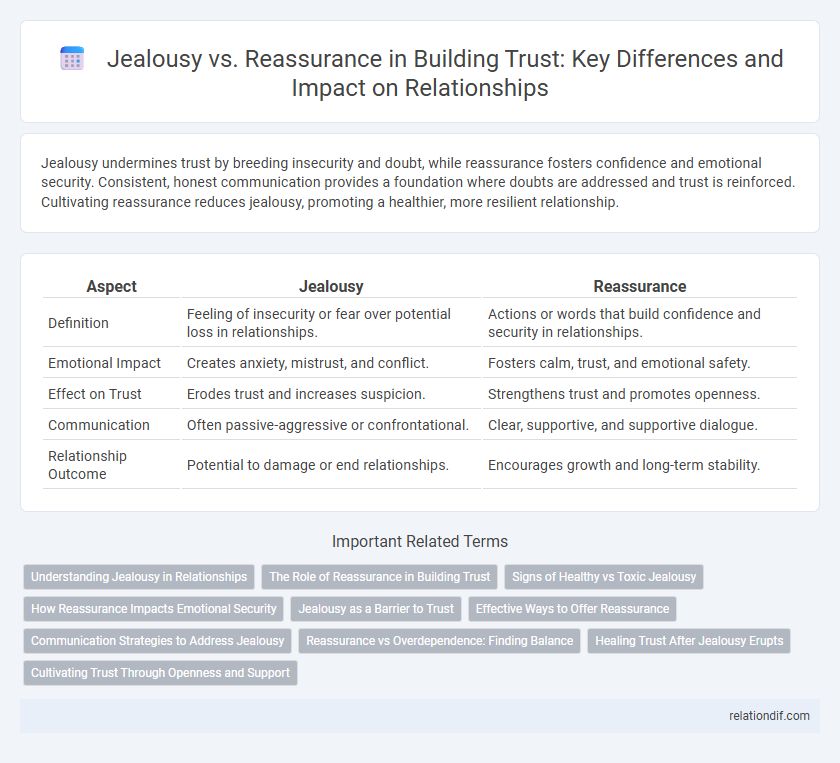Jealousy undermines trust by breeding insecurity and doubt, while reassurance fosters confidence and emotional security. Consistent, honest communication provides a foundation where doubts are addressed and trust is reinforced. Cultivating reassurance reduces jealousy, promoting a healthier, more resilient relationship.
Table of Comparison
| Aspect | Jealousy | Reassurance |
|---|---|---|
| Definition | Feeling of insecurity or fear over potential loss in relationships. | Actions or words that build confidence and security in relationships. |
| Emotional Impact | Creates anxiety, mistrust, and conflict. | Fosters calm, trust, and emotional safety. |
| Effect on Trust | Erodes trust and increases suspicion. | Strengthens trust and promotes openness. |
| Communication | Often passive-aggressive or confrontational. | Clear, supportive, and supportive dialogue. |
| Relationship Outcome | Potential to damage or end relationships. | Encourages growth and long-term stability. |
Understanding Jealousy in Relationships
Jealousy in relationships often stems from insecurities and fear of losing a partner, highlighting the importance of open communication and emotional reassurance. Understanding the root causes of jealousy allows couples to build trust and create a safe space for vulnerability. Consistent reassurance strengthens emotional bonds and reduces misunderstandings that fuel jealousy.
The Role of Reassurance in Building Trust
Reassurance plays a crucial role in building trust by addressing insecurities that often fuel jealousy in relationships. Consistent and sincere expressions of support help partners feel valued and secure, reducing doubts and misunderstandings. This foundation of reassurance strengthens emotional bonds, promoting mutual confidence and long-term trust.
Signs of Healthy vs Toxic Jealousy
Healthy jealousy often manifests as mild insecurity that prompts open communication and mutual reassurance, strengthening trust in relationships. Signs of toxic jealousy include obsessive behavior, constant accusations, and controlling tendencies that erode trust and cause emotional distress. Recognizing these patterns allows individuals to foster reassurance and address underlying issues before jealousy turns destructive.
How Reassurance Impacts Emotional Security
Reassurance strengthens emotional security by consistently affirming trust and reducing anxiety in relationships. When partners provide clear, honest communication and validate each other's feelings, jealousy diminishes significantly. This ongoing support fosters a stable environment where emotional vulnerabilities are safely expressed and managed.
Jealousy as a Barrier to Trust
Jealousy often acts as a significant barrier to trust by fostering insecurity and suspicion within relationships, undermining mutual confidence. Persistent jealousy triggers defensive behaviors and constant doubt, which erodes emotional safety and transparency between partners. Addressing jealousy through open communication and reassurance is crucial to rebuilding trust and promoting relational stability.
Effective Ways to Offer Reassurance
Offering reassurance effectively involves consistent, honest communication and demonstrating reliability through actions that align with words. Providing specific affirmations about commitment and listening empathetically to concerns helps reduce insecurity linked to jealousy. Building trust requires patience, transparency, and validating emotions without dismissing underlying fears.
Communication Strategies to Address Jealousy
Effective communication strategies to address jealousy involve open and honest dialogue that fosters trust and understanding between partners. Active listening and expressing feelings without blame can reduce insecurity and promote reassurance. Consistent reassurance through affirming words and actions helps to alleviate jealousy and strengthen relational bonds.
Reassurance vs Overdependence: Finding Balance
Reassurance plays a crucial role in building trust by providing emotional security without fostering overdependence in relationships. Finding balance requires clear communication and establishing personal boundaries to ensure support does not undermine individual autonomy. Effective reassurance nurtures confidence while promoting mutual respect and personal growth.
Healing Trust After Jealousy Erupts
Healing trust after jealousy erupts requires open communication and consistent reassurance to rebuild emotional safety in relationships. Addressing insecurities through empathy and validating feelings helps repair the damage caused by jealousy, fostering a stronger bond over time. Establishing transparent boundaries and demonstrating reliability are key factors in restoring confidence and trustworthiness.
Cultivating Trust Through Openness and Support
Jealousy often stems from insecurity and lack of communication, undermining trust in relationships. Cultivating trust requires openness, where partners share feelings and concerns honestly without fear of judgment. Providing consistent support reassures individuals, reinforcing confidence and reducing the need for jealousy.
Jealousy vs reassurance Infographic

 relationdif.com
relationdif.com